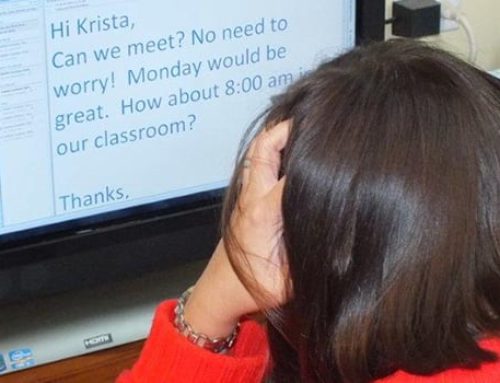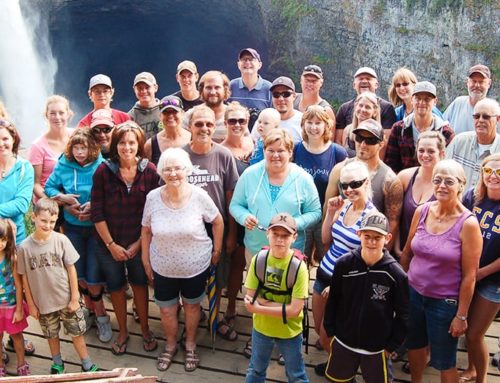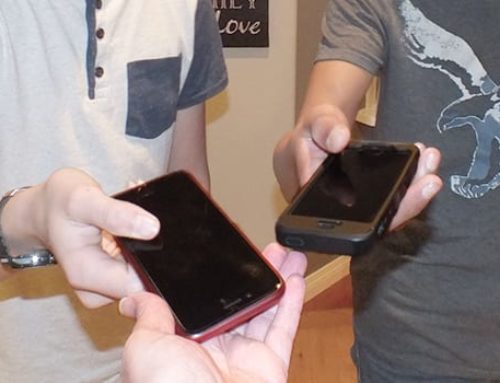BY KOENRAAD BEUGELINK, FAITH FORMATION DIRECTOR
Before reading any further:
Please try not to respond to your phone notifications until you are done reading.
This week we started our “We Will, We Won’t” digital citizenship series at the secondary campus. This will be a staggered system-wide series of various lengths over the next few weeks.
So, if your kids come home wanting to delete their social media apps or they ask you to turn the Wi-Fi off at supper time or they admit your idea of wanting to take a hammer to their device is not a bad idea, you will know where that is coming from. Okay, who am I kidding…but, seriously though, that would be kind of great. As much as those dreamland ideals would be amazing, they might not be very realistic. I do, however, believe there is a space between the less-than-ideal tension we experience with our own and our kids’ online world and an unrealistic utopia that we need to strive for. This “We Will, We Won’t.” series (WWWW) is a way to take some small steps toward that space.
How Persuasive!
I cannot tell you how often our community’s online world impacts the things we are trying to do in our offline school world. Whether it is the impact of social media on our students’ mental health, or their struggle with active listening rather than rushing to cancel others during class discussion, or bullying and social pressuring that has moved from their DM’s and texts into the hallways and learning spaces, the impact of social media (or persuasive technology) is far reaching.
But it’s not just Gen Z that struggles. I’m sure you know adult friends and relatives who are on Facebook and “doom scrolling” their own feeds and re-posting theories borrowed from their personalized echo chambers.
I admit that Twitter’s algorithms have figured out just the right time to get me to click on the SportChek ad for their irresistible clearance sale on Canadian Men’s National Team soccer jerseys. I’m Dutch, so I’ll keep checking until a jersey comes down in price to less than $45. Persuasive technology IS effective at holding our attention and selling that attention and our intent to consume.
Starting The Conversation
At the secondary, we will be using clips from the Netflix documentary The Social Dilemma as a discussion starter for conversations around social media and mental health, and social media and our polarizing discourse on and off line. I highly recommend all parents to watch it for themselves and watch it with their teens to promote discussion in the home. Spoiler alert: They won’t want to, and you can’t force them to like it, but sometimes in life we have to do and see things we don’t like or hear things that make us feel a bit…unsettled. That’s okay.
I appreciate The Social Dilemma for helping us to understand how this technology works and what its intentions are. These companies are the most profitable in history because persuasive technology does what it promises.
Okay fine—I bought a WhiteCaps jersey from that SportChek ad and a bright red Nike Canadian soccer hat. It was on sale! I’m Dutch! The stupid ad kept showing up. I couldn’t resist! Arrrrg.
Where the documentary leaves me frustrated is that it seems to suggest over and over that the only way to overcome the addictive allure of social media (the adulterous woman of Proverbs 7) is to have the government impose restrictions. I have no doubt the government has some responsibility in this, but I am not sure any of us can hold our collective breath and wait long enough for the government to realize big tech has had too long of a leash and contributed enough social angst within culture.
We need to act sooner.
Wisdom Before Soccer Sales
This is where we step in with this WWWW series. Social media and persuasive technology will not simply disappear. It may one day be regulated, but our community needs to practice digital citizenship the same way that wisdom calls out in Proverbs 8: “Don’t go down that street”, “they are persuading you with the things you want to see and hear, but it’s not what you need”, “be more discerning, judgment is lacking.”
My personal guiding text for this series is Proverbs 8:10-11: “Choose my (wisdom’s) instruction instead of silver, knowledge rather than gold, for wisdom is more precious than rubies, and nothing you desire can compare with her.” The point: wisdom must prevail over the shiny things we hold precious (yes, even soccer sales) and discernment is needed.
These 5 We Wills and 5 We Won’t practices (you’ll see these posted around the three campuses) are not exhaustive; we arrived at these because system-wide, these are realities ACS is regularly noticing and responding to. The five practices present us with positive and negative constructs from which to pursue wisdom as we continue to live with persuasive technology.
The great news, of course, is that Jesus reigns! Salvation, freedom, and a new way of living are an inheritance we are invited to live into now. We don’t need to wait for the CRTC or a Prime Minister to step in to save us from big tech. We can turn our phones off, mute our notifications, shut off devices at dinner and while we sleep, hold each other to community digital standards and do more things that make us forget to check our phones. We can engage our families, our churches, and our campuses in conversations about why these things are important.
We invite you to join us on the WWWW discernment journey in the next few weeks as you gather around dinner tables, living rooms, church zoom chats, backyard small groups, and classrooms. Each campus will also be sending out a link with tools and resources you can use to continue these conversations at home.
Ding! Did you make it through without checking your notifications?
Did you feel like checking them when you were reading words like notifications?
RESOURCES
Download & print the WWWW parent poster:
Books:
Parent Guides:
Social Media
TikTok
Snapchat
Fortnite
Websites:
The Ultimate Set of Internet Safety Resources
Common Sense Media: Social Media
Presentations and Training Courses:
Abby PD and Pathways Presents Digital Literacy for Parents
We Will We Won’t Practices:
We Will learn to listen/discuss & We Won’t jump to judge
We Will practice powering down & We Won’t let technology control our lives
We Will remember that we are loved and valued & We Won’t look for our worth online
We Will record and post with permission & We Won’t snap and hide
We Will think twice before posting and sending & We Won’t engage in emotional posting







WHAT DO YOU THINK?